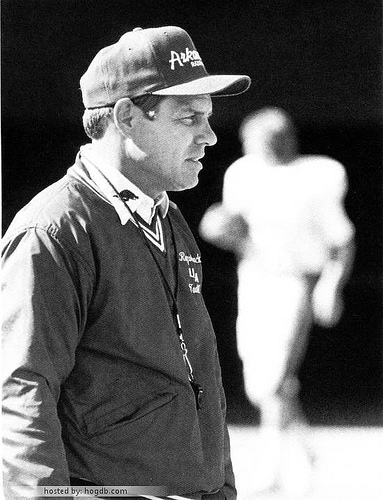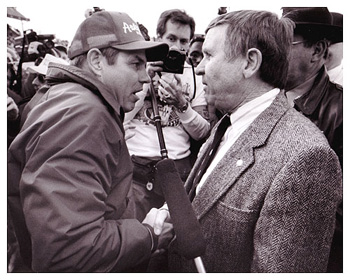
This is the third and final installment of our Q&A with former Razorback player and coach Ken Hatfield (here are parts 1 and 2 if you need to catch up). In today's segment, Hatfield offers his thoughts on many of the memorable Razorback players that he coached and discusses Houston Nutt and Bobby Petrino. A thousand thanks to Coach Hatfield for being so generous with his time. Interviewing him was a real pleasure.
Expats: Of all the great players you've had, who were the guys who would consistently amaze you with what they could do on the field, and who were the other ones who maybe weren't quite as talented, but they had a lot of heart and they were able to excel because of that?
I'm not sure I can single out anybody because the whole team was full of people like that. Here's Wayne Martin, a guy from Cherry Valley, Ark. They lived in an old cotton patch, and his dad used to do roofing work. His dad would take a Greyhound bus to everywhere Wayne would play.
He'd get to the Greyhound station in Fayetteville and walk all the way from the station to the ballgame, spend the night in Wayne's room on the floor, and get up and walk back to the Greyhound bus station every week, just to see him play.
And then to see Wayne be drafted in the first round of the NFL Draft - and also his brother was drafted in the second round of the NBA Draft the exact same year - and to know they were going to be able to take care of their mother and father, that was one of the great joys of coaching.
Barry Foster didn't even play his senior year and went on to become an outstanding NFL running back for the Pittsburgh Steelers. Steve Atwater was a quarterback in high school. We gave him one pass play to throw as a freshman, and we immediately moved him to safety! He threw an end-over-end spiral that wasn't too exciting, so I said, "You need to go safety."
And to see the kind of dominator he was in the NFL - he was 6'4" and a just a mean, mean and tough safety. He was like a linebacker playing back there.
Freddie Childress - here's a guy that had played defense all the time. He loved defense, and we asked him the middle of his freshman year to move to offense. He had to think long and hard about it, but he said, "For the good of the team, I will."
I remember the next week, we played SMU, and they had a great All-American tackle. Freddie would bounce right out of that huddle, be the first one to the line of scrimmage, and I mean he would pancake that All-American, just knock him on his butt. And I knew then we had a great player at offensive guard.

Expats: Who were some of the guys who were really strong leaders in the locker room and away from the playing field, that guys that maybe made your job a little easier?
Hatfield: There were so many of them. We were kind of unique: we did not have permanent captains until after the season was over. What I tried to do was, I'd tell all the seniors: this is your team, this is the one you are going to be remembered for. So, we would get three or four to be the captains each week, and it was kind of their role to represent the team. But the seniors really ran the team in the locker room. All the seniors did.
We had whole teams full of people who really cared about each other. It wasn't just one or two.
I remember James Rouse in a game against New Mexico State. We were having trouble, and James was sick as a dog. He was throwing up - I didn't even think he could go out in the second half.
Bubba Rouse [James' father] said, "You're going to play in the second half. This team needs you. We need you to go out there." Sure enough, James went out there and just had a tremendous second half and won the ballgame for us.
Those moments with everybody contributing, whether it be a fan or whether it be a player or Dean Webber getting guys well out there on the field - the fun thing about it was that it was a total team effort, and that's what I loved about it.
Expats: We wanted to get your reflections on Houston Nutt's tenure in Arkansas. In some ways, there were some similarities - both of you guys are natives of the state who played at Arkansas. Is it hard for a coach to return and coach at a school that he played at?
Hatfield: That's not hard - it's just hard to be a coach for a long time at any place. It's hard to meet the expectations for a long period of time. But I think that someone that comes back to his state - they know the emotions. They know the fans. They know the traditions. Certainly, they can relate to a lot of different things.
I think Houston was a tremendous coach. Whatever the things that happened and transpired, overlooked are a lot of the accomplishments that they had as a staff. I know they had the two losing years, and they followed that up with an opportunity to play for the national championship. In the SEC game against Florida that year, Percy Harvin just makes a great run. And certainly losing the punt was a big difference in the ball game.
If we make one of those two plays, then Arkansas actually would have been playing for the national championship that year. You've gotta give credit: When you come off two losing seasons and you can get everybody playing together to get you to the point where you're playing in the SEC Championship against a great Florida team and have a chance to beat them, that's darn good coaching. You've got everybody buying into a system when you can do that.
You couple that with one of the greatest wins in Arkansas history - going down to LSU and beating them 50-48 the year they win the national championship. That's not bad anyway that you look at it. I think that is monumental.
They had some great games: the overtime games with Matt Jones and all of the things he did. I look at all the great things and the great moments they had, and I think that he pulled the team together.
You take Peyton Hillis and Felix Jones and Darren at the same time - Holy Toledo! I think as much as anything, the loss of Peyton Hillis the last four games [in 2006] cost Arkansas the chance to play for the national championship. I think that had he been well, that one extra addition in their offensive weaponry would have made the difference, and they could have been playing for the national championship.
You've gotta give credit - he got them to the point where they could play for a national championship. And that's the thing that I'll remember about Houston the most.
Expats: What's your take on Bobby Petrino and how do you think things are going?
Hatfield: Number one, he's proven he's a heck of a coach with the things he did at Louisville, beating the teams that he did.
The second thing is, offensively, they're going to be extremely skilled in every aspect. The receivers. The running backs are deep. The line is extremely big, and the tight ends are as good as they've ever had.
The quarterbacks had an outstanding spring and fall practice. I think both Mallett and Tyler Wilson are going to be really good quarterbacks.
The defense is kind of like our team in '89: there's nobody just sticking out right now and saying, "I'm the one who is going to be the dominant player." I think the whole key for them defensively is turnovers. They are going to have to take advantage of the turnovers. Have fresh legs and knock the ball loose when you have a chance and run it in. Come up with the interception - when you have a tipped ball, you just can't knock it down. If they can do those things, I think they will have a good defensive team.
The unknown thing is the kicking game. The punter is completely unknown. Tejada has all the ability in the world. I think he is looking forward to having a great year. Kendall Trainor started off bad in '88 for us and then made 24 in a row.
A lot of things have to fall into place early, and I think if they do, it will give this team a lot of confidence, and no telling how far they can go.
Expats: Now that you've had almost a couple of decades pass since you were the coach at Arkansas, what stands out to you about that time? Are there any particular feelings or memories that sum up that era? What's your general impression looking back now?
Hatfield: Well, my impression was that I was very thankful to even have the opportunity to come back to Arkansas. To come back and coach and try to pass on to the players the moments, the thrills, the excitement, the feeling of what a fighting Razorback is all about - that is one of the great joys I had.
I gave it the best I had for six years. All of our coaches did. All of our families did. As I say, there were some good moments, and there were some down moments.
I hope people will remember the good moments. I'm going to remember the good moments. I'm going to remember the players, the games and the fans.
One of our most exciting times was in the Cotton Bowl against UCLA. We ran out there, and there had to have been over 55,000 Arkansas fans in the stands. That was the first time Arkansas had been there in 13 years. It was an exciting moment, because I knew what it meant to all of the people who were there and also what it meant to all of the people back in the state of Arkansas.
I gave it my very best, and I wouldn't trade it for anything.
